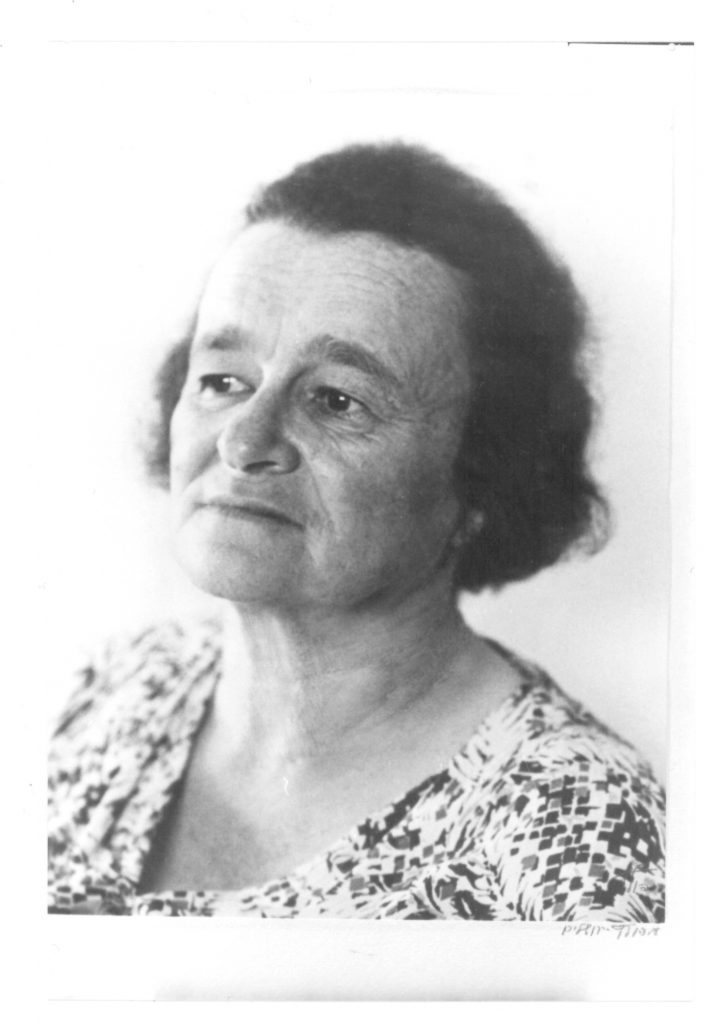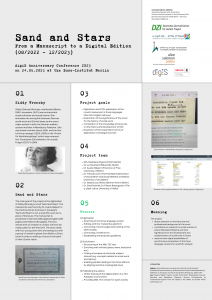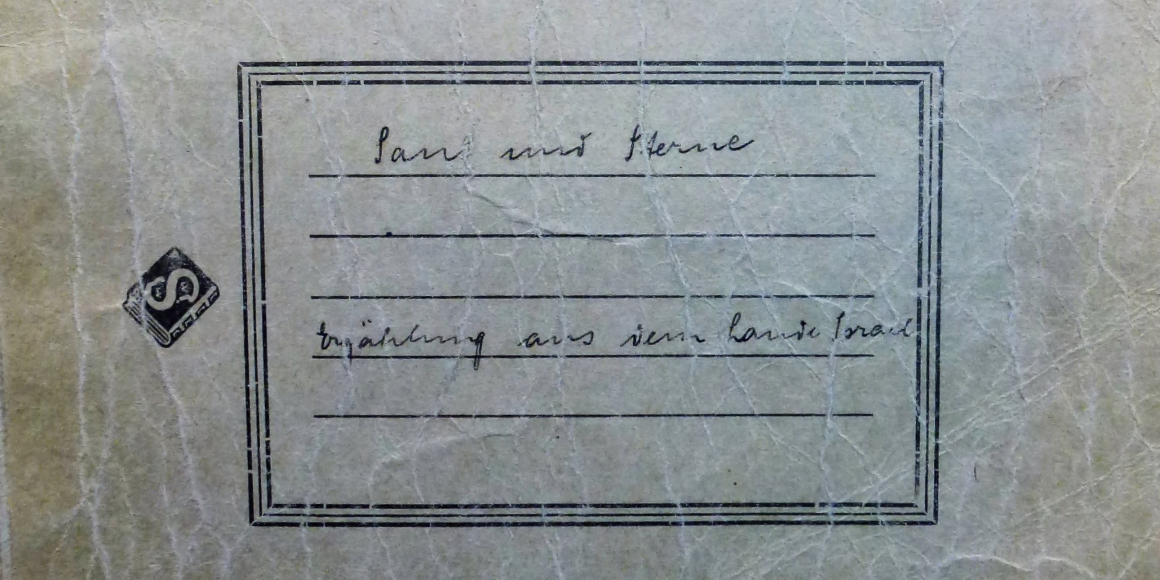(for Hebrew version click here; for German version see below)
Siddy (Sidonie) Wronsky (Berlin, 1882–Jerusalem, 1947) was an important social reformist and social worker. She embodies the strong link between German social work and Zionist ideas, as she was a major activist in both the German welfare system and later in the Jewish community in Mandatory Palestine. Wronsky grew up in Berlin in a Jewish family of seven children; her father was of German descent while her mother was East European. She started her career as a special education teacher and later studied “mental hygiene”, a discipline which sought to fight poverty, crime and diseases using preventive and social measures (Halpern 2019, p. 1087).
Later, she was active in the bourgeois women’s movement, in particular in the Jewish women’s movement. Her activism in the area of support for people in need and in the development of coordinated welfare structures in Berlin in the first half of the 20th century, make her one of the most influential persons in terms of professionalization and academization of social work in Germany and Israel (Reinicke 2008).
Siddy Wronsky was board member (since 1914), chairwoman (since 1918), and the first full-time manager (1923-1933) of the “Archiv für Wohlfahrtspflege” (archive for welfare work), which was renamed into “Deutsches Zentralinstitut für soziale Fragen (DZI)” (German Central Institute for Social Issues) in 1964.

(Berlin 1883 – 1947 Jerusalem)
She was editor of the Deutsche Zeitschrift für Wohlfahrtspflege (German journal of welfare work), the predecessor of the journal Soziale Arbeit (Social Work), which is published by DZI and the Berlin Senate Department for Integration, Labour and Social Services. By the time she was forced to emigrate to Palestine in 1933, the archive had expanded under her direction into a documentary center of a nation-wide scope with an extensive collection of relevant literature and case studies (Toppe 2020). Siddy Wronsky took her knowledge and experience to Palestine where she was invited to build up the first school for social work in Jerusalem. She significantly contributed to the development of modern teaching and practice of social work in Palestine. Siddy Wronsky died on the 8th of December 1947 in Jerusalem only a few months before the foundation of the state of Israel.
The manuscript of the novel “Sand and Stars”
The main goal of the project is the digitization of Siddy Wronsky’s novel “Sand and Stars”. What is special about this work of literature is that it has not yet been published. The manuscript was found by Dr. Ayana Halpern in the course of scientific research activities in the Central Zionist Archives (CZA) in Jerusalem. Under the supervision of Prof. John Gal and Dr. Yehudit Avnir she there did research on the knowledge transfer from Jewish-German social workers to Palestine and on the development of social work in Mandatory Palestine.
“Sand and Stars” is not a scientific work but a piece of literature. The manuscript is presented in German (188 pages), English (109 pages), and Hebrew (84 pages). The text, whose time of creation is unclear, will now be made public for the first time. The story deals with four young Jews who are setting out with a group of Jewish orphans from Berlin to Eretz Israel in order to build up a future in the spirit of their Zionist vision. The novel is important from a historical point of view. So for instance it indirectly refers to Jewish welfare institutions in Berlin, such as the Berlin Jewish community’s children’s home Ahawah in Auguststraße, which Siddy Wronsky helped founding and running and whose building today still exists. Institutions in Israel that were established by immigrants from Germany, like for example the youth village Ben Shemen, are mentioned in the text, too. One of the main missions of the novel is to justify the practice of social work as an important tool in the effort to build the nation of Israel. This was very important to Wronsky due to the ambivalence regarding the image of social work in the Yishuv. Wronsky’s novel is an enthusiastic adherence to the main ethos of the nation’s salvation by Jews returning to toil the land. One of the major themes in the novel is the emphasis on the point that helping the needy and the poor is as important as building agriculture and industry.
The digitization project
 The DZI project not only aims at publishing Siddy Wronsky’s novel but also at making its historical and political background perceptible and comprehensible for present generations through a profound scientific reflection and accompanying documents.
The DZI project not only aims at publishing Siddy Wronsky’s novel but also at making its historical and political background perceptible and comprehensible for present generations through a profound scientific reflection and accompanying documents.
The piece and its scientific reflection are building bridges between Berlin and Israel by shedding light on the common history of professionalization of social work. The project contributes to research about social workers in exile in Mandatory Palestine and about their meaning for the development and academization of social work in Israel. It also widens DZI’s knowledge about its central founder Siddy Wronsky and makes a piece of the cultural heritage of Berlin accessible to the public and the scientific community.
Project duration
August 2022 – December 2023
Project goals
- Digitization and CC0-publication of the novel’s manuscript in three languages (German, English, Hebrew)
- Exploration of the significance of the novel for the history of social work
- Completion of the knowledge and sources on the history and development of DZI
- Expansion of DZI expertise in terms of digitization of analogue sources
Project team
The project team is inter-institutional and works in both Israel and in Germany.
M.A. Stephanie Pigorsch (DZI, Berlin), project management
Graduate economist Burkhard Wilke (DZI, Berlin), support in terms of organization and scientific advice
Dr. Ayana Halpern (Post-Doc at Free University of Berlin), scientific framing and editing
Dr. Yehudit Avnir (The Paul Baerwald School of Social Work and Social Welfare at Hebrew University of Jerusalem), scientific framing and editing
Dr. Dayana Lau (Alice Salomon Archive at Alice Salomon University of Applied Sciences Berlin), scientific support
Cooperating institutions
Central Zionist Archives
The special feature of the digitization project is that the manuscripts are located in Israel at the Central Zionist Archives (CZA). The CZA is the official archive of the institutions of the Zionist movement based in Jerusalem. The CZA was founded in 1919 in Berlin and after Hitler’s seizure of power was relocated to Jerusalem where it reopened in 1934. The archive accommodates a large amount of relevant resources and materials such as the personal archive of Theodor Herzl and several institutional archives. The preparation of usable scans of the German, English and Hebrew manuscripts will take place in the CZA due to historical and archival reasons.
Digital Humanities
The e-Llijah-Lab is a Digital Humanities laboratory at the Department of Jewish History and Bible Studies in the University of Haifa. The lab initiates and conducts various Digital Humanities projects in Jewish Studies and beyond, with special expertise in the areas of digital analysis of manuscripts, geo-temporal mapping of textual traditions and social historical archival data, crowdsourcing and citizen science. Dr. Sinai Rusinek and Dr. Eliezer Baumgarten were involved in the preparation of the edition.
Financing
The DZI project “Sand and Stars” run by DZI is financed with EUR 40,000 by Berlin’s Senate Department for Culture and Europe within the framework of the Berlin funding program of digitization of objects of cultural heritage. The project is scheduled from August 2022 to December 2023.
Through the relevant funding program, which first started in 2012, the Berlin Senate Administration supports cultural institutions in Berlin in their digitization of their resources and collections. Its goal is to make the cultural heritage accessible to the interested public. The funding program is realized by the Forschungs- und Kompetenzzentrum Digitalisierung Berlin (digiS) (research and competence center of digitalization Berlin) which is an institution of multidisciplinary counseling, support and coordination of digitization projects in Berlin.
Financial volume: EUR 40,000 (August 2022 – December 2023)
Contact
Stephanie Pigorsch (M.A. Social Work)
Deutsches Zentralinstitut für soziale Fragen
Bernadottestraße 94
14195 Berlin
E-Mail: pigorsch@dzi.de
Tel.: +49 (0) 30 / 83 90 01-37
References
Halpern, Ayana: Between universal and national ‘social therapy’? Professional interventions by Jewish social workers in British Mandatory Palestine. In: European Journal of Social Work 6/2019, pp. 1085-1097 (https://doi.org/10.1080/13691457.2018.1461074)
Reinicke, Peter: Siddy Wronsky – Ein Leben für die Sozialarbeit. In: Soziale Arbeit 7/2008, S. 242-250 (https://www.dzi.de/soziale-literatur/soziale-arbeit/archiv/jahrgang2008/?heftid=44#44)
Toppe, Sabine: Siddy (Sidonie) Wronsky. In: Digitales Deutsches Frauenarchiv, https://www.digitales-deutsches-frauenarchiv.de/akteurinnen/siddy-sidonie-wronsky#actor-publication (veröffentlicht 2020)
—
Digitalisierung von Siddy Wronskys Roman „Sand und Sterne“ – „Sand and Stars“ – „חול וכוכבים“
Siddy (Sidonie) Wronsky (1882-1947) war eine bedeutende Sozialreformerin und Sozialarbeiterin. Sie verkörpert die enge Verbindung zwischen der deutschen Sozialen Arbeit und zionistischen Ideen, da sie sowohl in der Wohlfahrtspflege in Deutschland als auch später in der jüdischen Community im Völkerbundsmandat für Palästina aktiv war. Siddy Wronsky wuchs in Berlin in einer jüdischen Familie auf und hatte sechs Geschwister. Ihr Vater war deutscher, ihre Mutter osteuropäischer Herkunft. Sie begann ihre Karriere als Sonderschullehrerin und setzte sich dann mit der Sozialhygiene auseinander, einer Disziplin, die darauf abzielte Armut, Kriminalität und Krankheiten mittels präventiver und sozialer Maßnahmen zu bekämpfen (Halpern 2019, S. 1087).
Sie engagierte sich in der bürgerlichen Frauenbewegung, insbesondere in der jüdischen Frauenbewegung. Ihr Einsatz im Bereich der Unterstützung von Hilfsbedürftigen und beim Aufbau koordinierter Wohlfahrtsstrukturen im Berlin der ersten Hälfte des 20. Jahrhunderts machen sie zu einer einflussreichen Persönlichkeit bei der Professionalisierung und Akademisierung der Sozialen Arbeit in Deutschland und in Israel (Reinicke 2008).
Siddy Wronsky war seit 1914 Vorstandsmitglied, seit 1918 Vorsitzende und dann von 1923 bis 1933 die erste hauptamtliche Geschäftsführerin des „Archiv für Wohlfahrtspflege“, das 1964 in „Deutsches Zentralinstitut für soziale Fragen“ umbenannt wurde. Sie war u.a. die Redakteurin der Deutschen Zeitschrift für Wohlfahrtspflege, der Vorgängerzeitschrift der heute vom DZI zusammen mit der Senatsverwaltung für Integration, Arbeit und Soziales des Landes Berlin herausgegebenen Fachzeitschrift Soziale Arbeit. Bis zu ihrer erzwungenen Emigration nach Palästina im Jahre 1933 wurde das Archiv unter ihrer Leitung „zu einem Dokumentationszentrum mit reichsweiter Ausstrahlung und einer umfangreichen Fachliteratur- und Fallsammlung, die Quellengrundlage war für die Arbeit der neuen Profession Soziale Arbeit“ (Toppe 2020). Siddy Wronsky nahm ihr Wissen und ihre Erfahrung mit nach Palästina, wo sie eingeladen war, die erste Schule für Sozialarbeit in Jerusalem aufzubauen. Sie war maßgeblich am Aufbau einer modernen Ausbildung, Praxis und der Strukturen der Sozialen Arbeit in Palästina beteiligt. Am 8. Dezember 1947, wenige Monate vor der Gründung des Staates Israel, starb Siddy Wronsky in Jerusalem.

(Berlin 1883 – 1947 Jerusalem)
Das Romanmanuskript „Sand und Sterne“
Hauptziel des Projektes ist die Digitalisierung des von Siddy Wronsky verfassten Romans „Sand und Sterne“. Das Besondere ist, dass es sich hierbei um ein noch unveröffentlichtes Werk handelt. Das Manuskript wurde 2017 im Zuge der Forschungsaktivitäten von Dr. Ayana Halpern in den Central Zionist Archives (CZA) in Jerusalem gefunden. Sie recherchierte dort, wissenschaftlich begleitet von Prof. John Gal und Dr. Yehudit Avnir, für ihre Dissertationsarbeit zum Wissenstransfer jüdisch-deutscher Sozialarbeiter:innen und der Entwicklung Sozialer Arbeit im Völkerbundsmandat für Palästina.
„Sand und Sterne“ ist keine wissenschaftliche Abhandlung, sondern ein literarisches Werk. Das Romanmanuskript liegt auf Deutsch (188 Seiten), Englisch (109 S.) und Hebräisch (84 S.) vor. Das Werk mit unklarem Erstellungsdatum wird nun das erste Mal öffentlich zugänglich gemacht. Es handelt von vier jungen Jüdinnen und Juden, die mit einer Gruppe jüdischer Waisenkinder von Berlin nach Eretz Israel aufbrechen, um dort im Sinne ihrer gemeinsamen zionistischen Vision eine neue Zukunft aufzubauen. Der Roman ist heute als zeitgeschichtliches Zeugnis bedeutsam. So wird dort u.a. indirekt Bezug genommen zu Berliner Einrichtungen der jüdischen Wohlfahrt, wie etwa dem Kinderheim Ahawah der Jüdischen Gemeinde Berlins in der Auguststraße, bei dessen Gründung und Betrieb Siddy Wronsky behilflich war und dessen Gebäude noch heute besteht. Auch Institutionen in Israel, die von Immigrant:innen aus Deutschland gegründet wurden, wie zum Beispiel das Jugenddorf Ben Shemen werden im Text erwähnt. Eine der großen Missionen des Romans war es, die Praxis der Sozialen Arbeit als ein wichtiges Werkzeug im Bemühen um den Aufbau des Staates Israel zu begründen. Dies war Siddy Wronsky wichtig hinsichtlich des ambivalenten Bildes über Soziale Arbeit im Jischuv. Ihr Roman ist ein enthusiastisches Festhalten am Ethos der Rettung des jüdischen Volkes. Eines der Hauptthemen des Romans ist die Betonung, dass die Hilfe für Bedürftige und Arme genauso wichtig ist wie der Aufbau von Landwirtschaft und Industrie.
Das Digitalisierungsprojekt
Mit dem Projekt will das DZI nicht nur den Roman Siddy Wronskys digital veröffentlichen, sondern dessen geschichtlichen und politischen Hintergrund für heutige Generationen erlebbar und nachvollziehbar machen: durch eine fundierte wissenschaftliche Einordnung und begleitende zeitgeschichtliche Dokumente.
Das zu digitalisierende Werk und seine wissenschaftliche Einordnung bauen Brücken zwischen Berlin und Israel, indem sie ein Licht werfen auf die gemeinsame Professionalisierungsgeschichte Sozialer Arbeit. Das Projekt leistet einen Beitrag zur Forschung zu exilierten Sozialarbeiter:innen im Völkerbundsmandat für Palästina und deren Bedeutung für den Aufbau und die Akademisierung Sozialer Arbeit in Israel. Es erweitert zudem den Wissensschatz des DZI zur zentralen Gründungsfigur Siddy Wronskys und macht ein Stück des kulturellen Erbes Berlins für die Öffentlichkeit und die wissenschaftliche Gemeinschaft zugänglich.
Projektzeitraum
08/2022 – 12/2023
Projektziele
- Digitalisierung und gemeinfreie Veröffentlichung der drei Sprachfassungen (Deutsch, Englisch, Hebräisch) des Romanmanuskripts
- Erschließung der historischen Bedeutung des Romans für die Geschichte der Sozialen Arbeit
- Vervollständigung der Wissens- und Quellenlage zur Geschichte und Entwicklung des DZI
- Erweiterung der Kompetenzen zur Digitalisierung analog verfügbarer Quellen beim DZI
Projektteam
Das Team des Projektes ist interinstitutionell zusammengestellt und arbeitet in Israel und Deutschland.
M.A. Stephanie Pigorsch (DZI, Berlin), Projektmanagement
Dipl.-Volkswirt Burkhard Wilke (DZI, Berlin), organisatorische und wissenschaftliche Begleitung
Dr. Ayana Halpern (Post-Doc an der Freien Universität Berlin), wissenschaftliche Begleitung und Bearbeitung
Dr. Yehudit Avnir (The Paul Baerwald School of Social Work and Social Welfare an der Hebrew University of Jerusalem), wissenschaftliche Begleitung und Bearbeitung
Dr. Dayana Lau (Alice Salomon Archiv an der Alice Salomon Hochschule Berlin), wissenschaftliche Begleitung des Projektes
Kooperierende Institutionen
Central Zionist Archives
Die Besonderheit des Digitalisierungsvorhabens liegt darin, dass sich die zu digitalisierenden Bestände in Israel in den Central Zionist Archives (CZA) befinden. Die CZA sind das offizielle Archiv der Institutionen der zionistischen Bewegung mit Sitz in Jerusalem. Die CZA wurden 1919 in Berlin gegründet und nach der Machtergreifung Hitlers nach Jerusalem verlegt, wo sie 1934 wieder öffneten. Das Archiv beherbergt eine Fülle relevanter Materialien, wie etwa das persönliche Archiv Theodor Herzls und zahlreiche Institutionenarchive. Die Anfertigung verarbeitungsfähiger Scans der in Deutsch, Hebräisch und Englisch vorliegenden Romanmanuskripte wird aus zeithistorischen und archivalischen Gründen ausschließlich vor Ort in den CZA vorgenommen.
Digital Humanities
Das e-Llijah-Lab ist ein Labor für die Digital Humanities an der Abteilung für jüdische Geschichte und Bibelwissenschaften der Universität Haifa. Das Labor initiiert und führt verschiedene Digital-Humanities-Projekte in der Judaistik und darüber hinaus durch, mit besonderer Expertise in den Bereichen digitale Analyse von Manuskripten, geo-temporale Kartierung von Texttraditionen und sozialhistorischen Archivdaten, Crowdsourcing und Citizen Science. Dr. Sinai Rusinek und Dr. Eliezer Baumgarten waren an der Vorbereitung der digitalen Edition beteiligt.
Finanzierung
Das vom DZI verantwortete Digitalisierungsprojekt „Sand und Sterne“ wird von der Senatsverwaltung für Kultur und Europa des Landes Berlin im Rahmen des Förderprogramms zur Digitalisierung von Objekten des kulturellen Erbes des Landes Berlin im Projektzeitraum August 2022 bis Dezember 2023 mit insgesamt 40.000 Euro finanziert.
Die Senatsverwaltung unterstützt mit diesem 2012 erstmals aufgelegten Programm Kultureinrichtungen in Berlin bei der Digitalisierung von Sammlungen und Beständen. Ziel ist es, das Kulturgut digital dauerhaft für die interessierte Öffentlichkeit zugänglich zu machen. Das Förderprogramm zur Digitalisierung von Kulturgut des Landes Berlin wird umgesetzt durch das Forschungs- und Kompetenzzentrum Digitalisierung Berlin (digiS), einer Einrichtung zur spartenübergreifenden Beratung, Unterstützung und Koordinierung von Digitalisierungsprojekten in Berlin.
Finanzvolumen: 40.000 € (August 2022 – Dezember 2023)
Kontakt
Stephanie Pigorsch (M.A. Soziale Arbeit)
Deutsches Zentralinstitut für soziale Fragen
Bernadottestraße 94
14195 Berlin
E-Mail: pigorsch@dzi.de
Tel.: +49 (0) 30 / 83 90 01-37
Literatur
Halpern, Ayana: Between universal and national ‘social therapy’? Professional interventions by Jewish social workers in British Mandatory Palestine. In: European Journal of Social Work 6/2019, S. 1085-1097 (https://doi.org/10.1080/13691457.2018.1461074)
Reinicke, Peter: Siddy Wronsky – Ein Leben für die Sozialarbeit. In: Soziale Arbeit 7/2008, S. 242-250 (online verfügbar unter https://www.dzi.de/soziale-literatur/soziale-arbeit/archiv/jahrgang2008/?heftid=44#44)
Toppe, Sabine: Siddy (Sidonie) Wronsky. In: Digitales Deutsches Frauenarchiv, https://www.digitales-deutsches-frauenarchiv.de/akteurinnen/siddy-sidonie-wronsky#actor-publication (veröffentlicht 2020)
Gefördert durch:


